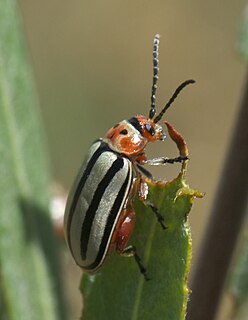
Buprestis is a genus of beetles in the family Buprestidae, the jewel beetles. As of 2011 there were 78 described species distributed across most of the world's ecozones except parts of Africa and Antarctica.

Hygrotus is a genus of beetle in family Dytiscidae. It contains two subgenera and about 70 species, including:

Lepturinae, the lepturine beetles, is a subfamily of the longhorn beetle family (Cerambycidae), containing about 150 genera worldwide. This lineage is most diverse in the Northern Hemisphere. Until recently the subfamily Necydalinae was included within the lepturines, but this has been recently recognized as a separate subfamily. Nine tribes are usually recognized today, with a tenth, Caraphiini, created in 2016. A few genera are of uncertain placement within the subfamily.

Ilybius is a large genus of predatory aquatic beetles in the family Dytiscidae. The genus is native to the Palearctic, the Near East, the Nearctic, and North Africa. 70 species has been described from this genus:

Donacia is a large genus of aquatic leaf beetles in the subfamily Donaciinae. Like other members of that subfamily, the beetles have long antennae. They are active and able to fly. Larvae feed on submerged portions of aquatic plants, such as water lilies, and breathe oxygen from plant vessels. Adults live on surface parts of the same plants.

Melandryidae is a family of false darkling beetles in the order Coleoptera. There are at least 40 genera and 100 described species in Melandryidae.

Chauliognathus is a genus of soldier beetles in the family Cantharidae. Adults have almost rectangular bodies. Some are red and black, similar to the military uniforms that were common before the usage of camouflage, hence the name of soldier beetles. Others are orange and black. The elytra or first pair of wings are softer than the elytra of most beetles, that is why their other common name is leatherwings. The adults are frequently found on flowers, such as sunflowers, goldenrod, coneflowers, where they mate and feed on pollen and nectar. The larvae are more common in the ground or among debris, where they feed on eggs or larvae of other insects. The adults are most frequently found in summer and early fall. They are native to America and Australia.

Dicerca is a genus of beetles in the family Buprestidae, containing the following species:

Pasimachus is a genus of beetles in the family Carabidae, containing the following species:

Acanthocinus griseus is a species of longhorn beetle of the subfamily Lamiinae. It was described by Johan Christian Fabricius in 1792 and is known from Europe, Russia, and Asia Minor. The beetles are 8-13 millimetres long and live for approximately 1–2 years. They inhabit coniferous trees including those in the genera Pinus, Picea, and Abies. They are also known to inhabit oaks.
Acanthocinus nodosus is a species of longhorn beetles of the subfamily Lamiinae. It was described by Johan Christian Fabricius in 1775.
Acanthocinus obliquus is a species of longhorn beetle of the subfamily Lamiinae. It was described by John Lawrence LeConte in 1862.
Acanthocinus spectabilis is a species of longhorn beetles of the subfamily Lamiinae. It was described by John Lawrence LeConte in 1854.

Phymatodes is a genus of beetles in the family Cerambycidae, containing the following species:

Neoclytus is a genus of beetles in the family Cerambycidae, containing the following species:
Anelaphus is a genus of beetles in the family Cerambycidae, containing the following species:

Epicauta is a genus of beetles in the blister beetle family, Meloidae. The genus was first scientifically described in 1834 by Pierre François Marie Auguste Dejean. Epicauta is distributed nearly worldwide, with species native to all continents except Australia and Antartica. Surveys have found the genus to be particularly diverse in northern Arizona in the United States. Few species occur in the Arctic, with none farther north than the southern Northwest Territory of Canada.

Ophraella is a genus of beetles belonging to the family Chrysomelidae.

Disonycha is a genus of flea beetles in the family Chrysomelidae. There are at least 30 described species in Disonycha.

Mycetophagus is a genus of hairy fungus beetles in the family Mycetophagidae. There are at least 20 described species in Mycetophagus.
















